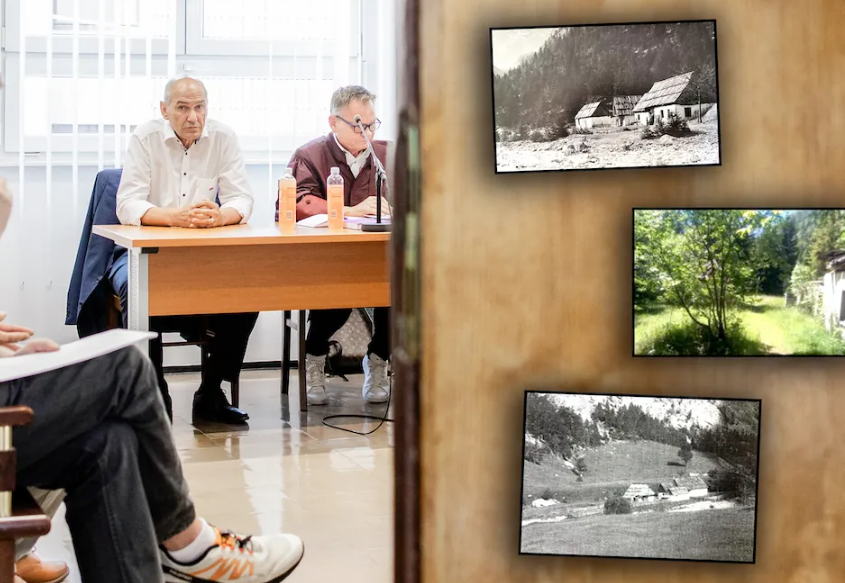The trial of three defendants, including Janez Janša, in the Trenta case resumed on Tuesday. Before that, the Celje District Court ruled that Andrej Volk and Suzana Žinić would remain judge jurors in what could be called the Patria 2 case, as it is a trial that started after almost 20 years. “The standards of a Kočevje trial,” Janez Janša, the leader of the largest opposition party – the Slovenian Democratic Party (Slovenska demokratska stranka – SDS), criticised the court’s decision.
In the explanation of its decision, the court said that the defence’s request should be rejected because it was unfounded. “After two months, everything has been rejected. The head of the legal department of the Velenje Municipality and current Minister of Justice Katič’s long-time colleague Suzana Žinić can sit “independently” on the jury in the Trenta case. The same goes for the former candidate of the Liberal Democracy of Slovenia party (Liberalna demokracija Slovenije – LDS),” Janez Janša pointed out in relation to the court’s decision, noting that this trial has the “standards of a Kočevje trial.” Janša also believes that this is happening because the next elections are close. “The leftists have never won fairly,” he noted.
These are two people with well-known political backgrounds
On the 9th of July, when the trial was due to start, there were complications over the appointment of all three members of the Chamber. Judge Marko Brišnik initially took over the trial. However, he was excluded from the Chamber after the defence had already succeeded in its request to exclude part of the evidence some time ago. Mojca Turinek was next in line and should have taken over the Chamber, but she recused herself, followed by Cvetka Posilovič. Although the Rules of the Court require that the selection be made in alphabetical order, the remaining two jurors were selected after some strange skipping of certain judges. This raises serious doubts in many people’s minds about the legality of the composition of the Chamber. Especially since, in the case of Žinić and Volk, it is a fact that they are people with known political backgrounds.
Two decades ago, Volk ran for municipal councillor in Šoštanj on the list of the LDS party, which was considered to be a major political opponent of Janša, and later, he ran again – on the list of Our Country party (Naša dežela). When asked whether he had run on the LDS list for the Šoštanj Municipal Council in 2006, he said that it was possible, but he could no longer remember. Meanwhile, Žinić joined the Velenje Municipality as head of the legal department at a time when the municipal administration was headed by a prominent member of the Social Democrats party (Socialni demokrati – SD), Andreja Katič, who holds the post of Minister of Justice in the current government. As we have already reported, Žinić also admitted at the trial that she knew Katič and that they were colleagues in the municipal administration in the municipality of Velenje. According to the Demokracija magazine (Democracy), the juror stated that she was not friends with the Minister. She was also asked by lawyer Franci Matoz whether Katič had really organised a celebration at the municipality when Janša went to prison in the Patria case, but she stated that she was not aware of this. When asked whether Katič had appointed her as head of the legal department, Žinić replied that she did not remember.
The composition of the Trial Chamber is important
The importance of the composition of the Trial Chamber was recently explained to our media outlet by Constitutional Court Judge Jan Zobec. “In this case, as in any other case, it is important who the judges are, because the verdict depends on it. And since jurors have the same voice as a professional judge, it is even more important who the jurors are. They must be legitimate, that is to say, natural judges,” he made clear, among other things. He also explained that natural or lawful jurors are those who are selected in the manner laid down by the Rules of Court. This, he said, is so that there is no manipulation of the composition of the chamber. In addition to the legality of judges, he stressed the importance of the impartiality of judges, which also applies to jurors. “If a party has any concerns about the impartiality of the jurors, it can request that they be disqualified, especially if there are grounds or circumstances that would cast doubt on their impartiality,” he explained.
Janša’s lawyer, Matoz, also pointed to the unusual circumstances of the appointment of the two jurors, as it became clear that, for unknown reasons, they had been chosen despite not being next on the alphabetical list, saying that the other jurors were overworked. As there were reasonable doubts as to the impartiality of Žinić and Volk, Matoz moved to strike out the two jurors, but the Celje District Court insisted on the unchanged composition of the Chamber.
Janša: This has definitively confirmed that this is a political process
In a statement to the media outside the Celje courthouse, Janša said that on Monday, they had received final confirmation that this is a political process. “The court apparently needed two months to decide not to disqualify any jurors. That is to say, a close associate of the Minister of Justice remains in the Chamber. The only thing worse than that would be if Minister Katič herself were on the panel. I have no illusions about what will happen.”
A. H.


